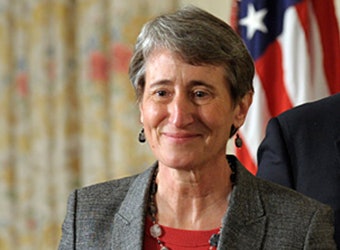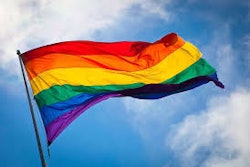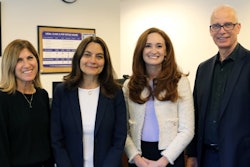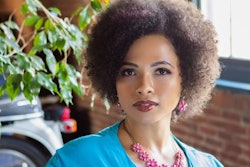 Interior Secretary Sally Jewell said she wants to highlight sites and events connected to the LGBT community that are relevant to portraying a more complete picture of the nation’s history.
Interior Secretary Sally Jewell said she wants to highlight sites and events connected to the LGBT community that are relevant to portraying a more complete picture of the nation’s history.The U.S. Department of the Interior is hosting a panel discussion of historians, scholars and preservationists today to discuss ways to educate the public about lesbian, gay, bisexual and transgender history.
The event kicks off a National Park Service theme study to identify and interpret places and events connected to the story of the LGBT community so that they can be included in parks and programs.
“There are sites that have played important roles in our nation’s ongoing struggle for civil rights,” says Interior Secretary Sally Jewell. “The theme study will help ensure that we understand, commemorate and share these key chapters in our nation’s complex and diverse history.”
Currently, the Stonewall Inn in New York City is the sole LGBT-associated site that has designation as a National Historic Landmark for its significance in U.S. history. In 1969, patrons of the Stonewall Inn, a bar frequented by LGBT individuals, rioted to protest long-running police harassment. The incident is widely recognized as launching the LGBT civil rights movement.
The Park Service theme study is part of a broader initiative by President Barack Obama to ensure that the agency educates and interprets for the public the most complete story possible about Americans. The LGBT effort joins ongoing heritage initiatives to celebrate minorities and women who have made significant contributions to U.S. history and culture. Those theme studies focus on women, Latinos and Asian Americans and Pacific Islanders.
Over the course of the next 12 to 18 months, the Park Service will work with scholars and historians to explore ways to commemorate LGBT history. Scholars who have been invited to participate in today’s panel discussion are from institutions such as the University of Illinois at Chicago; the University of Maryland; the University of North Carolina, Charlotte; and Yale, Stanford, Florida State and San Francisco State universities.
The theme study occurs at a time when support for LGBT rights still remains uneven around the country.
For instance, California passed a first-of-its-kind law in 2011 mandating that public schools teach students about the historical contributions of LGBT Americans, although budget woes have dried up textbook funds so few districts thus far have implemented it. Meanwhile, eight states have laws forbidding teachers to discuss LGBT people in positive ways, according to the Gay, Lesbian and Straight Education Network. Arizona, for example, bans school curriculum that “portrays homosexuality as a positive alternative lifestyle.”
However, Park Service Director Jonathan Jarvis says his agency, which is preparing to celebrate its centennial in 2016, is committed to sharing more diverse stories, especially those involving civil rights. Jarvis says that by telling stories key to LGBT history, “we are inviting new audiences to visit their national parks and historic sites and to discover a personal connection in these special places.”
Jarvis adds, “It is our job to be sure that Americans never forget where we’ve been, where we are and where we aspire to be as nation.”
Goals of the LGBT heritage initiative include:
- Engaging scholars, preservationists and community members to identify, research and tell stories about LGBT-associated properties.
- Encouraging national parks and national heritage areas to interpret LGBT stories.
- Identifying, documenting and nominating LGBT-associated sites as National Historic Landmarks.
- Increasing the number of listings of LGBT-associated properties in the National Register of Historic Places.
The National Register is this country’s inventory of properties deemed central to its history and worthy of recognition and preservation. It contains more than 89,000 entries, incorporating more than 1.7 million buildings and sites representing locally, regionally or nationally renowned people, places and events.
Only 2,500 of these properties are National Historic Landmarks, which represent the highest level of significance. However, few of these properties represent stories connected to women, African-Americans, Latinos, Asian Americans and Pacific Islanders, American Indians, Native Alaskans and Native Hawaiians.
The Park Service is encouraging the nomination of properties associated with underrepresented groups. In the past four years, about 70 percent of nominated National Historic Landmarks represent stories of diversity.
Meanwhile, only four LGBT history-related properties are included in the National Register of Historic Places. They are:
- Dr. Franklin E. Kameny residence in Washington, D.C. A civil rights activist, Kameny was fired from his federal government job over his sexual orientation in 1957 and argued his case up to the U.S. Supreme Court. The high court declined to hear his petition, but the case was among the first of its kind.
- Cherry Grove Community House and Theater in Fire Island, New York. The hamlet of Cherry Grove is regarded as socially significant for being one of the first openly gay and lesbian communities nationally.
- James Merrill House in Stonington, Connecticut. A Pulitzer Prize-winning writer, Merrill produced numerous volumes of poetry and other works.
- Carrington House in Fire Island, New York. The house is one of the earliest residential properties in the gay-friendly resort community.
The theme study is a public-private partnership with funding provided by the Gill Foundation.
Tim Gill, founder of the foundation, called the historical contributions of LGBT individuals “part of the great American journey toward full equality, freedom and liberty for all citizens. We need to unite together in the days ahead to ensure we leave none of our fellow Americans behind.”
Today’s meeting, hosted by Jewell and Jarvis, is scheduled for 2:30 p.m. at the Interior Department in Washington, D.C. The public is invited to attend and offer input about the LGBT initiative. Remarks will also be delivered by U.S. Rep. Nancy Pelosi, D-Calif., and U.S. Ambassador to Australia John Berry.



















